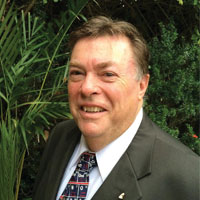 Joe Stetter Improves PPE Sterilization
Joe Stetter Improves PPE Sterilization
Joe Stetter is an optimist, inventor, entrepreneur, and owner of two small businesses that stayed open through the lockdown. KWJ Engineering and Spec Sensors manufacture essential health and safety sensors with medical and industrial applications. In our series, The ECS Community Adapts and Advances, Joe shares the challenges of doing business “not as usual”, and reports on a research collaboration he mobilized to improve PPE sterilization for COVID-19 frontline workers.
Safety first
“Our crew (of) about twenty people wear masks and check temperatures. We distanced work and assembly stations. It’s more difficult to interact. Moving inventory and receiving deliveries is cumbersome. Production has slowed down…the social part of working is difficult. We asked them to shelter-in-place when not at work. Everyone is tired of the disruption, but fortunately our great team is willing to make sacrifices. Those at the frontlines in health care are putting their lives at risk every day—so the sacrifices we make are really for them.”
Pride in products supporting the frontlines
“We take pride in the quality of our products…used in important safety and health applications. Ozone, used to sterilize or clean water, is a toxic gas. Our ozone sensor acts as an emergency shutoff by monitoring levels outside the sterilization chamber. We make equipment to control the ozone level during sterilization. Our inline monitor for carbon monoxide and other gasses makes it possible for firefighters and hospital patients to breath compressed air.”
PPE shortages inspire action
“My niece, a nurse, gets one mask a week and keeps it in a paper bag. I asked our engineers, ‘Can we build a small, portable, inexpensive sterilizer for people who have to reuse their PPE?’ We have the technology and are funding it initially from our R&D budget. Our engineers are donating their expertise. We developed designs and shipped the equipment to a collaborator who builds demonstration versions in his garage. Normally, we would meet in person to trouble shoot… but we made do remotely. Within weeks, the demonstration models were ready.
There’s already interest in the sterilizer. A hospital ultrasound technician in Seattle…suggested making a video to get more people on board. I’ve had Skype calls with…the health system in Ireland and several U.S. hospitals. Mike Carter, from the ECS Sensor Division Executive Committee, is on our team. Our partners include Wisconsin Lutheran College, Medical College of Wisconsin, and James Keane Bashkin, George W. Gokel, Fredrik Inglis, and Christopher Spilling at the University of Missouri-St. Louis.
Frontline workers will have more peace of mind knowing they are reusing a biologically clean mask. It’s really exciting to do something for the real heroes from the hospitals to the grocery stores. We cannot take for granted the people who keep this country moving. Hopefully, we can roll something out quickly to help them.”
How businesses grow
“The NIH (National Institutes of Health), NSF (National Science Foundation), and DOD (Department of Defense) have special requests for proposals for small business innovation grants to fund COVID-19-related research. We submitted our proposal to all three. These grants are typically small—maybe $100,000…enough to get to the next step. Then we apply for larger grants or look for commercial funding.
We’re well-schooled at this. Five years ago, we got a grant to try printed electronics and electrochemical sensors. With the successful prototype, we…corralled a few million dollars in investment capital. We set up the factory and have made and sold nearly a million sensors.
It’s exciting to develop a small idea into a bigger idea—and create more jobs. Most new jobs are created by small businesses and innovative ideas. To make things happen, you need to be optimistic, determined, and persevere. Stick with a good idea and don’t be deterred. Doing the science, engineering, and electrochemistry keeps my brain active. I don’t see myself retiring!”
The biggest changes
“I’m co-chairing the 18th International Meeting on Chemical Sensors held jointly with The Electrochemical Society. I look forward to bringing 600 people from around the world together again. …I go to other meetings, the International Ozone Association, the American Chemical Society (ACS), and The Electrochemical Society biannual meetings—where I always look forward to socializing, discussing ideas, and coming up with new ideas—doing science.
Video is a wave of the future for communication—it’s not just for playing games with the grandkids, though those are the most important calls! I would rather hug my grandkids or get a beer with colleagues, but (video) works well. I did a Zoom lecture recently…I could see the students and they could see my slides. We used a white board for jotting down ideas and Q&A. Video calls are not perfect, but they will have to do until there are better treatments and a vaccine. When you can’t get into the lab, you have to go on. An upside is that you have more time to thoroughly think through an experimental plan.”
ECS’s high technical profile
“I have been an ECS member for fifty years. I’ve been involved with (other) organizations over the years. I’m particularly fond of ECS because it maintains a very high technical profile, and promotes Free the Science—open access for publications. This really helps people in industry, in small businesses. When I have an idea or want to learn something for a project or task, I go online and access what I need. The ECS Digital Library is important to me—to keep my mind active, to advance projects, or solidify theories and thoughts. It’s my hope that people and politicians recognize the value of science and technology, use good science to address the many challenges society faces, and make progress for the health and well-being of all people. I’m a born optimist.”
To learn more about the portable, low-cost mask sterilizer, watch Joe’s video. To support this work or inquire about potential partnership, write to Joe and the team at sanitizer@spec-sensors.com.


